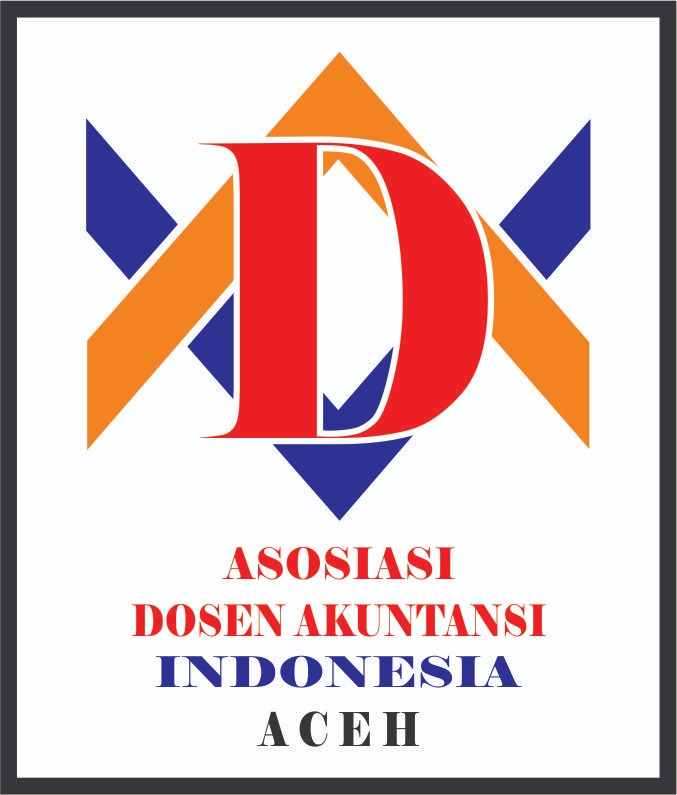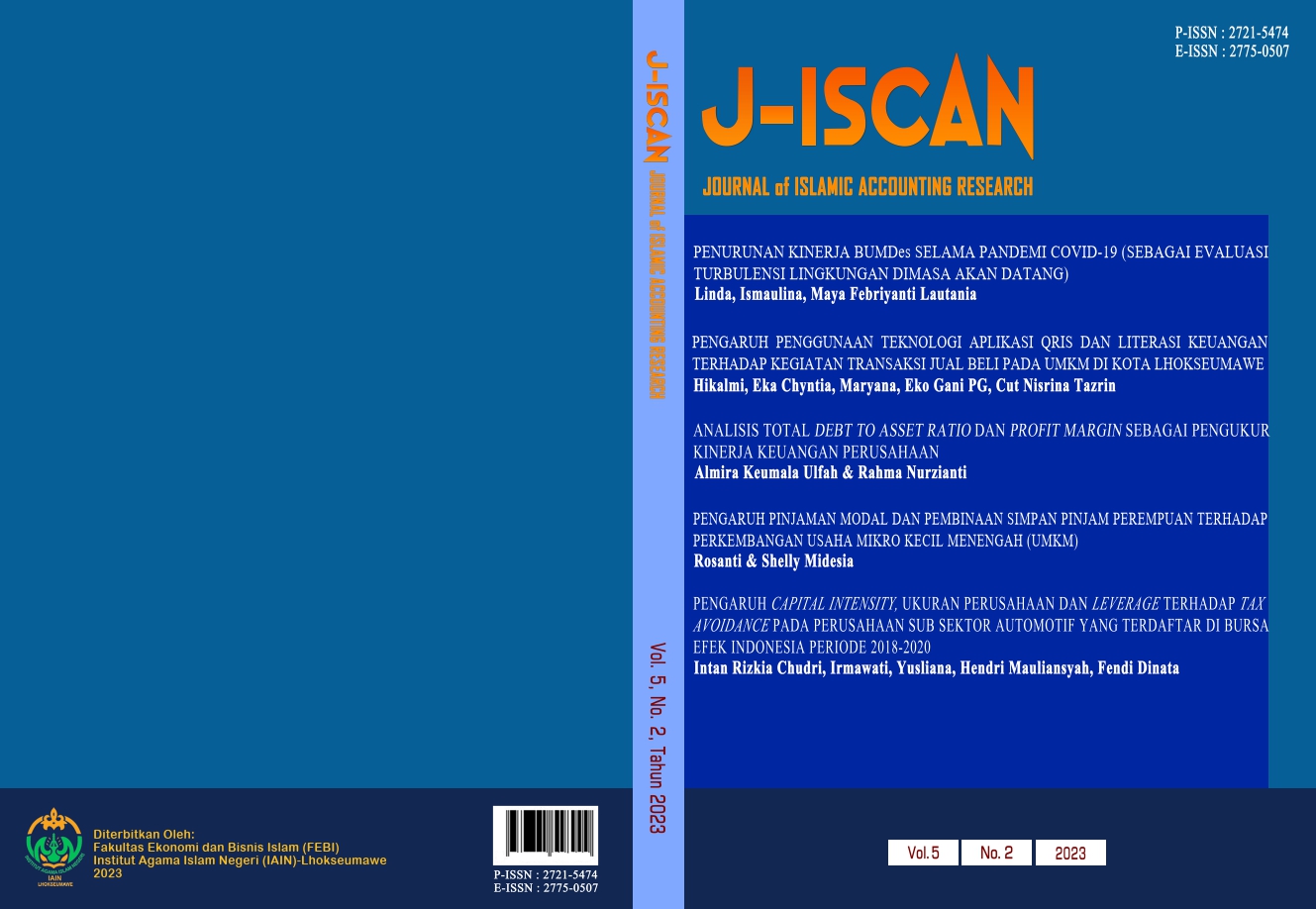THE INFLUENCE OF THE USE OF QRIS APPLICATION TECHNOLOGY AND FINANCIAL LITERACY ON BUYING AND BUYING TRANSACTION ACTIVITIES IN MSMEs IN LHOKSEUMAWE CITY
Main Article Content
Hikalmi Hikalmi
Eka Chyntia
Maryana Maryana
Eko Gani PG
Cut Nisrina Tazrin
The role of MSMEs in Indonesia is often linked to government efforts to reduce unemployment, fight poverty and equalize income. Collaboration between MSMEs and electronic money organizers will be able to advance the Indonesian economy. Quick Response Code Indonesian Standard or usually abbreviated as QRIS (pronounced KRIS) is a combination of various types of QR from various Payment System Service Providers (PJSP) using a QR Code. Currently QRIS is used in all payment applications which can be used in all shops, traders, stalls, parking lots, tourist tickets, donations (merchants) with the QRIS logo. Someone with good financial literacy can see money from a different perspective so they can control their financial condition. In its implementation, QRIS still has various obstacles, one of which is the level of financial literacy of the Lhokseumawe City MSME community which is still low so that people's understanding of digital finance is still lacking and not evenly distributed. This research aims to examine whether the QRIS application implemented by MSMEs influences the increase in buying and selling transactions in the community, as well as whether people's financial literacy influences transaction decisions using the QRIS application. The results of this research show that financial literacy and ease of use have a positive and significant influence on the choice of using QRIS by MSMEs in the city of Lhokseumawe. Financial literacy has a positive and significant impact on MSME transactional operations in the city of Lhokseumawe. This shows how people, especially MSMEs, have strong knowledge and skills in terms of financial management, which influences their choice to use one of the financial technology products, namely QRIS.
Anastasia Anggi Palupi. (2022). Pengaruh Literasi Keuangan Dan Kemudahan Penggunaan Sistem Qris Terhadap Keputusan Bertransaksi Menggunakan Qris Pada UMKM. Seminar Nasional Riset Terapan, Vol 10,1, 1–9. https://prosiding-old.pnj.ac.id/index.php/snrtb/article/view/5607
Aribawa, D. (2016). PENGARUH LITERASI KEUANGAN TERHADAP KINERJA DAN KEBERLANGSUNGAN UMKM DI JAWA TENGAH. Journal SIASAT BISNIS, 20(1), 1–13. https://doi.org/https://doi.org/10.20885/jsb.vol20.iss1.art1
Huston, S. J. (2010). Measuring Financial Literacy. Journal of Consumer Affairs, 44(2), 296–316. https://doi.org/10.1111/j.1745-6606.2010.01170.x
Hutagalung, R. A., Nainggolan, P., & Panjaitan, P. D. (2021). Analisis Perbandingan Keberhasilan UMKM Sebelum Dan Saat Menggunakan Quick Response Indonesia Standard (QRIS) Di Kota Pematangsiantar. Jurnal Ekuilnomi, 3(2), 94–103. https://doi.org/10.36985/ekuilnomi.v3i2.260
Munawar, A., Suryana, & Nugraha. (2020). Pengaruh Literasi Keuangan dan Faktor Demografi terhadap Pengambilan Keputusan Berinvestasi (Survei Pada Mahasiswa STIE Wikara). Akuntabilitas, Vol. 14, N(2), 253–268.
Nadilla, T., & Hidayanti, A. (2021). Opportunities And Challenges Of Sharia Accounting Development. In Corolla International Conference (Vol. 1, No. 1, pp. 106-109). Prov.Aceh, D. (2022). Data UMKM. Open Data (Berbagi Data Untuk Kemajuan). https://data.acehprov.go.id/id/dataset/data-umkm-tahun-2020
Rahmawati, A. S., & Dewi, R. P. (2020). View metadata, citation and similar papers at core.ac.uk. PENGARUH PENGGUNAAN PASTA LABU KUNING (Cucurbita Moschata) UNTUK SUBSTITUSI TEPUNG TERIGU DENGAN PENAMBAHAN TEPUNG ANGKAK DALAM PEMBUATAN MIE KERING, 3, 274–282.
REPUBLIKA.CO.ID. (2023). 83 Persen Transaksi QRIS Didominasi Pelaku UMKM. REPUBLIKA.CO.ID. https://ekonomi.republika.co.id/berita/rykauh502/83-persen-transaksi-qris-didominasi-pelaku-umkm
Restiani, F., & Ima Amaliah. (2022). Faktor-Faktor yang Mempengaruhi Preferensi Masyarakat di Kota Bandung terhadap Keputusan Penggunaan Sistem Pembayaran Quick Response Code Indonesian Standard. Bandung Conference Series: Economics Studies, 2(2), 256–263. https://doi.org/10.29313/bcses.v2i2.3201
Safira, M. E., & Susanti, S. (2020). Pengaruh Literasi Keuangan, Promosi Uang Elektronik, dan Kemudahan Penggunaan terhadap Keputusan Penggunaan Uang Elektronik. JPEKA: Jurnal Pendidikan Ekonomi, Manajemen Dan Keuangan, 4(2), 97–112. https://doi.org/10.26740/jpeka.v4n2.p97-112
Sholihah, E., & Nurhapsari, R. (2023). Percepatan Implementasi Digital Payment Pada UMKM: Intensi Pengguna QRIS Berdasarkan Technology Acceptance Model. Nominal Barometer Riset Akuntansi Dan Manajemen, 12(1), 1–12. https://doi.org/10.21831/nominal.v12i1.52480
Sihaloho, J. E., Ramadani, A., & Rahmayanti, S. (2020). Implementasi Sistem Pembayaran Quick Response Indonesia Standard Universitas Sumatera Utara (1)(2)(3). Jurnal Manajemen Bisnis, 17(2), 287–297. http://journal.undiknas.ac.id/index.php/magister-manajemen/
Tambunan, T. T. H. (2002). Usaha kecil dan menengah di Indonesia : beberapa isu penting (Salemba Empat (ed.)). Salemba Empat. https://opac.perpusnas.go.id/DetailOpac.aspx?id=449436
Triutomo, I., Putra, P., & Heruwasto, I. (2022). Factors Affecting Consumer Intention To Use Qris During the Covid-19 Pandemic By Using C-Tam-Tpb. The 6th International Conference on Family Business and Entrepreneurship, 308–317. https://doi.org/http://dx.doi.org/10.33021/icfbe.v3i1.3783
Ulfah, A. K. (2018). Kinerja Personil Pemakai Sistem Informasi Akuntansi Setelah Pelatihan Sistem Informasi Akuntansi Pada Polda Aceh. Jurnal Bis-A: Jurnal Bisnis Administrasi, 7(2), 40-46.
Widiyanti, W. (2020). Pengaruh Kemanfaatan, Kemudahan Penggunaan dan Promosi terhadap Keputusan Penggunaan E-Wallet OVO di Depok. Moneter - Jurnal Akuntansi Dan Keuangan, 7(1), 54–68. https://doi.org/10.31294/moneter.v7i1.7567


